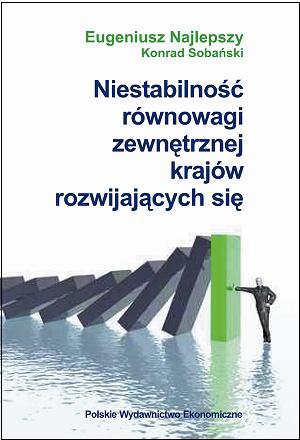Niestabilność równowagi zewnętrznej krajów rozwijających się
Publication date: 2010
Place publication: Warszawa
Publication: I
Binding: paperback
Format: 162x237
The book revels macroeconomic and institutional pre-conditions determining the stability of the balance of payments in a selected group of developing countries. The Authors, Prof. Eugeniusz Najlepszy and Konrad Sobański, PhD, focused upon methods of identification and forecasting the threats that result from an imbalance of current accounts within the balance of payments under conditions of increasing globalization. The theoretical part of the book includes an analysis of the process of developing countries’ external stability of. Then, in the empirical part, a model is shown allowing to diagnose the abrupt changes in the current accounts and financial-capital accounts in balances of payments of developing countries, which enables early detection of processes occurring there and of trends being either opportunities or threats to a country’s international liquidity.
The book is addressed to lecturers and students of economic faculties in universities.
On 18 October 2010 Prof. Eugeniusz Najlepszy and Konrad Sobański, PhD became winners of the 16th edition of the Competition held by Bank Handlowy S.A. in Warsaw, for their particular contribution into development of science in the field of economics and finance.
Spis treści
Wprowadzenie
1. Warunki stabilności zewnętrznej krajów rozwijających się
1.1. Wzrost roli kapitału międzynarodowego w systemie finansowym kraju
1.2. Podstawowe sektory gospodarki krajowej w warunkach otwartych rynków finansowych
1.3. Relacje gospodarki krajowej z otoczeniem międzynarodowym
1.4. Ośrodki władzy gospodarczej a napływ kapitału globalnego
1.5. Model stabilności zewnętrznej gospodarki krajowej
1.6. Uwagi końcowe
2. Otoczenie międzynarodowe w perspektywie globalnej
2.1. Upadek systemu Bretton Woods
2.2. Fale ekspansji finansowej w gospodarce globalnej
2.3. Globalna gra na rynkach finansowych
2.4. W kierunku światowego ładu finansowego
2.5. Uwagi końcowe
3. Teoretyczne koncepcje oceny deficytu obrotów bieżących i analizy jego stabilności
3.1. Rozwój teorii bilansu płatniczego - rys historyczny
3.2. Deficyt rachunku bieżącego jako zakłócenie - tradycyjne podejście do oceny nierównowagi obrotów bieżących
3.2.1. Podejście elastycznościowe
3.2.2. Podejście absorpcyjne
3.2.3. Podejście monetarne
3.3. Deficyt obrotów bieżących jako przejaw optymalizacji konsumpcji podmiotów gospodarczych w długim okresie; międzyokresowe podejście do rachunku bieżącego
3.3.1. Koncepcja analizy międzyokresowej w teorii bilansu płatniczego
3.3.2. Doktryna Lawsona jako aplikacja analizy międzyokresowej
3.4. Koncepcje oceny bezpieczeństwa deficytu obrotów bieżących
3.4.1. Koncepcja stabilności deficytu obrotów bieżących oparta na wypłacalności gospodarki
3.4.2. Rozszerzenie koncepcji stabilności nierównowagi obrotów bieżących o aspekty behawioralne
3.4.3. Koncepcja nadmiernego deficytu obrotów bieżących
3.5. Uwagi końcowe
4. Przegląd wyników badań empirycznych w zakresie zewnętrznej stabilności gospodarki
4.1. Problematyka zewnętrznej stabilności gospodarki w badaniach empirycznych
4.2. Badania Milesi-Ferretti i Razina
4.3. Badania Frankela i Rose'a
4.4. Badania Eichengreena, Rose'a i Wyplosza
4.5. Badania Goldsteina, Kaminsky i Reinhart
4.6. Uwagi końcowe
5. Tendencje w bilansie płatniczym i międzynarodowej pozycji inwestycyjnej krajów Europy Środkowo-Wschodniej w latach 1998-2007
5.1. Zjawisko deficytu obrotów bieżących w krajach Europy Środkowo-Wschodniej
5.2. Współzależność przepływów finansowych bilansu płatniczego i zmian międzynarodowej pozycji inwestycyjnej
5.3. Deficyty obrotów bieżących a źródła ich finansowania w krajach Europy Środkowo-Wschodniej
5.3.1. Tendencje na rachunku obrotów bieżących
5.3.2. Tendencje na rachunku finansowym i kapitałowym
5.4. Deficyty obrotów bieżących a zmiany międzynarodowej pozycji inwestycyjnej krajów Europy Środkowo-Wschodniej
5.4.1. Struktura i dynamika międzynarodowej pozycji inwestycyjnej netto
5.4.2. Tendencje w procesie akumulacji aktywów rezerwowych
5.5. Wskaźniki sektora zewnętrznego w krajach Europy Środkowo-Wschodniej
5.5.1. Miary zadłużenia i struktury pasywów zagranicznych
5.5.2. Miary płynności międzynarodowej
5.6. Uwagi końcowe
6. Procedura empirycznej analizy uwarunkowań korekt deficytu obrotów bieżących w krajach rozwijających się
6.1. Problem oceny bezpieczeństwa deficytu obrotów bieżących
6.2. Cel badania empirycznego w grupie krajów rozwijających się
6.3. Zakres próby i źródła badawcze
6.3.1. Zakres przedmiotowy
6.3.2. Zakres podmiotowy
6.3.3. Źródła badawcze
6.3.4. Korekty bilansu płatniczego włączone do próby
6.4. Czynniki warunkujące korekty deficytu obrotów bieżących
6.4.1. Charakterystyka czynników wewnętrznych
6.4.2. Charakterystyka czynników zewnętrznych
6.5. Uwagi końcowe
7. Empiryczne modele oceny stabilności deficytu obrotów bieżących w krajach rozwijających się i ich aplikacja w krajach Europy Środkowo-Wschodniej
7.1. Metody analizy empirycznej
7.2. Determinanty korekt deficytu rachunku bieżącego - wyniki analizy sygnałów
7.2.1. Kwestie metodyczne
7.2.2. Zakres zmiennych oraz ich poziomy krytyczne
7.2.3. Jakość predykcyjna zmiennych
7.2.4. Estymacja ryzyka korekty rachunku bieżącego w próbie
7.2.5. Podsumowanie wyników
7.3. Determinanty korekt deficytu rachunku bieżącego -wyniki regresji logistycznej .
7.3.1. Kwestie metodyczne .
7.3.2. Model regresji logistycznej i jego wykorzystanie do estymacji prawdopodobieństwa korekty rachunku bieżącego w próbie
7.3.3. Podsumowanie wyników
7.4. Stabilność deficytu bilansu obrotów bieżących w krajach Europy Środkowo-Wschodniej - aplikacja modeli empirycznych
7.4.1. Zakres oceny
7.4.2. Ocena stabilności deficytu obrotów bieżących w latach 1998-2007
7.5. Uwagi końcowe
Refleksje podsumowujące
Literatura
| Odbiór osobisty | 0 € |
| Inpost Paczkomaty | 3 € |
| Kurier Inpost | 3 € |
| Kurier FedEX | 3 € |
| Free delivery in Reader's Club | from 48 € |


 Our website uses cookies in order to, among others, collect statistical data and ensure proper functioning of the site. Further use of the website without changing settings in your browser means that cookies will be saved in your device. Please note that you can always change these settings.
Our website uses cookies in order to, among others, collect statistical data and ensure proper functioning of the site. Further use of the website without changing settings in your browser means that cookies will be saved in your device. Please note that you can always change these settings.